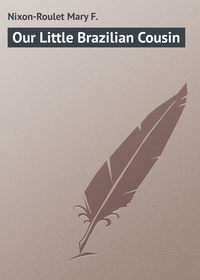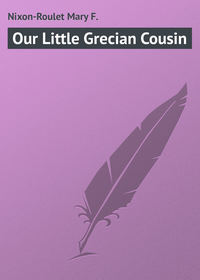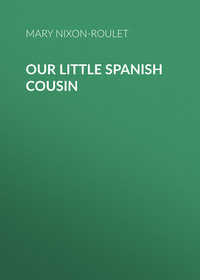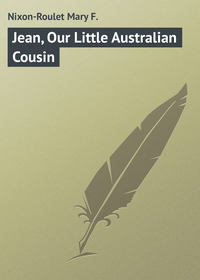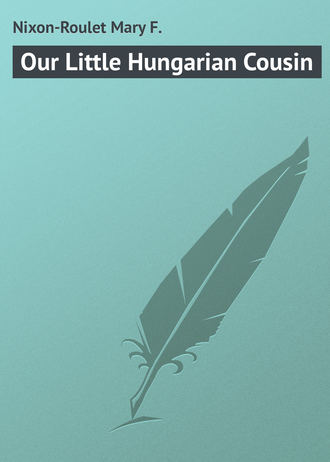 полная версия
полная версияOur Little Hungarian Cousin
"Jarnik won't," said Marushka. "He's dead!"
"Dead!" The woman was a little disconcerted.
"He died during the night," said Banda Bela. "There is great wailing for him now. We came away because nobody wanted us around. They will wail all day."
"Eat with us again, children," said the kind-hearted shepherd. "Your cheeks are the cheeks of famine. You are hungry, both eat! and the boy can make music for us. There will be time enough to question the Gypsies to-morrow."
Before the herder's hut a bough with several short branches protruding from it had been thrust into the ground, and upon these cooking pots had been hung. Soon goulash was simmering in the pot, and kasa was tossed together. The peasant's wife had brought bread and fine cheese, and curious-looking things which the children had never seen before.
"These are potatoes," said she. "They are new things to eat in this part of the country. The Government wants to encourage the people to earn their living from the earth. So it has made a study of all that can be raised in the country. Hungary produces grapes, maize, wheat, cereals, hemp, hops, and all manner of vegetables, and the State helps the people to raise crops in every way that it can. About five years ago the head of the Department of Agriculture decided that the people should be taught to raise potatoes, which are cheap vegetables and very nourishing. Arrangements were made with three large farms at Bars, Nyitra, and Szepes, to raise potatoes from seeds sent them by the Department. The next season these potatoes were distributed for seed to smaller farmers, with the condition that they in turn distribute potatoes for seed to other farmers. In this way nearly everyone soon was raising potatoes.
"Sit and eat," said she, and the children feasted royally. There was white wine to drink, but Marushka had buffalo's milk, cool and sweet. The little girl's face was smiling and she looked bright and happy.
Then Banda Bela played his very best, for the kindness had won his heart.
"Can you sing, boy? Have you music in your throat as well as in your fingers?" asked the shepherd's wife.
"I sing a little, yes," he answered. "I will sing to you the 'Yellow Cockchafer,' which Czuika Panna sang to Ràkoczi."5

The boy's voice was sweet and true, and he sang the little song prettily, but so mournfully that tears streamed down the broad, red face of the peasant woman.
"Why do you sing to break one's heart?" she demanded, and Banda Bela answered:
"I sang it but as my mother sang when she was here."
"She is dead, then?"
"She and my father, my brothers and sisters. I have no one left." The boy's face clouded.
"Me you have," said Marushka, with a funny little pout.
"I must go to my herd now," said the shepherd. "Come back to-night and we shall give you your supper for another song."
They reached the shepherd's hut that evening to find his wife awaiting him, but he did not come. He was far away with his herd. As it grew dark his wife gave the children bread and milk and bade them hurry to bed.
"It is late for little children like you," she said. "To-morrow we will see you again. To-day I asked about you at the camp and got but black looks in answer."
Banda Bela hurried Marushka away, fearing a scolding, for he had not meant to stay away all day, but when he reached the camp it was dark and still. The fire was nearly out under the fire-pot, the tent flaps were closed. He dared not waken any one, but Dushka, an old Gypsy woman with an evil face, looked out from her tent.
"Oh, it is you, is it?" she said. "Well, there is no food left, but drink this and you will sleep," and she gave each of the children a mug of dark liquid. It tasted bitter but they drank obediently. Then the old woman took Marushka into her tent while Banda Bela threw himself down under a poplar tree near the fire embers, and was soon fast asleep.
CHAPTER IV
DESERTED
Banda Bela slept heavily through the night. He dreamed in a confused way that he heard the Gypsies talking and one of them said, "She brings ill luck. Men ask of her white locks. The boy is well enough, though one more to feed. But the other brings ill fortune to the band." Another said, "No ill will come to them." Then he dreamed no more, but slept a dead and heavy sleep. He was awakened by a hand upon his shoulder. Some one shook him and he started to his feet to see the shepherd bending over him.
"What is it?" asked Banda Bela.
"Where is your camp and where is the little girl?" demanded the shepherd.
Banda Bela looked around him in amazement. Of the Gypsy camp there was not a trace left, save that dead embers lay where once the fire-pot had been. Tents, carts, horses, Gypsies, – all had vanished from the face of the earth as completely as if they had never been there.
"They have gone and left me!" cried Banda Bela. "Marushka! Where is Marushka?"
"Banda Bela!" called a faint voice behind him, and he turned quickly to see the little girl sitting under a great poplar tree, rubbing her eyes stupidly. He ran to her and the shepherd caught her in his arms.
"What happened in the tent last night?" asked Banda Bela.
"Rosa took me on her lap and cried," said Marushka, "then I went to sleep; but why am I here and where is Rosa?"
"During the night my wife awoke and heard faint sounds of stirring about outside the tent and muffled horses' hoofs. One of the horse herd is missing, many things are taken from the cook hut, and the Gypsies are gone. I do not know why we did not hear them more plainly when they passed," said the shepherd.
"They always tie up their horses' feet in rags when they travel at night," said Banda Bela. "Now they may be many miles from here. No one knows where, for they always cover their tracks. Don't cry, Marushka, I'll take care of you."
"You are but a child yourself," said the shepherd. "Come to my hut and eat and then we shall see what is to be done."
Marushka dried her tears and followed Banda Bela. In silence the two children ate the bread and milk the shepherd's wife prepared for them. Then Banda Bela said:
"Stay here, Marushka. I am going to the cross-roads to see if they have left a sign for us, but I do not think it at all likely."
"What sign would they leave?" asked the shepherd.
"When they go and wish their friends to follow they leave at each cross-road a twig pointing in the direction they have gone. For fear one would think it but a stray twig they cross it with another, and the Gypsy always watches for the crossed branches when following a trail."
"You may look, but you will find no crossed branches at the cross-roads," said the peasant, as Banda Bela ran off. The peasant and his wife talked together in low tones. Soon the boy came back and shook his head mournfully.
"They have left no trail," he said. "They left us behind on purpose."
"The draught they gave you was drugged," said the shepherd. "Tell me, Banda Bela, what will you do?"
"I must take Marushka and go to the city," said the boy. "By walking slowly and often carrying her we can do it. In the city I can play in the streets and earn bread for both."
"But do you like the city? It is noisy and dirty. You will not be free as on the wild," said the peasant's wife.
"I shall like it not at all," said the boy. "But there is nothing else."
"If Marushka will come and live with me I will care for her as my child," said the shepherd's wife. "She shall have clean clothes and plenty to eat and a garden with flowers. Will you come, little one?"
Marushka looked up into the kind face and smiled. "I will come if Banda Bela may come also," she said. The shepherd laughed.
"I told you, Irma, it was useless to take the one without the other. Take both. Banda Bela will serve you well, of that I am sure."
"That I will," said the boy heartily. "Only take care of Marushka and sometimes let me play my music and I will do all that you tell me."
"In this world one can but try," said the shepherd's wife, "then see if good or evil come. I have not the heart to leave these two waifs to starve on this great plain. Come, Emeric, the horses! It will be night before I reach home and there will be much to do."
Almost before the children knew it they found themselves seated beside the shepherd's wife as the cart was whirled along in the opposite direction from which they had come.
They passed country carts made of a huge pine beam with a pair of small wheels at either end. Gay parties of peasants were seated on the pole, the feet braced against a smaller pole.
"What queer-looking people," said Marushka.
"They are not Magyars," said Banda Bela.
"How did you know that?" asked Aszszony Semeyer.
"My father told me many things of Hungary as we travelled together," said the boy. "He told me all the history of how the country first belonged to the Magyars. I remember it almost in the very words he told me."
"What did he say?" demanded Aszszony Semeyer.
"'Many hundreds of years ago the Hungarian people,' he said," began Banda Bela, "'were shepherds who tended their flocks upon the plains of Scythia. The story is that Nimrod, son of Japhet and Enet, his wife, went into the land of Havila, where Enet had two sons, Hunyar and Magyar. These grew up to be strong and to love the chase. One day, as they hunted, they heard sounds of music. These they followed, and came to the hut of the 'Children of the Bush,' where there were two daughters of the king, singing beautifully.
"'Hunyar and Magyar married these two sisters, and their lands were not enough. Westward they moved, from the children of Hunyar coming the Huns, from Magyar's children, the Magyars.
"'They conquered many peoples, but left to each its customs. All were ruled under one chief. So that is why we have so many different peoples to-day.'"
"You know more than I do, Banda Bela," said Aszszony Semeyer.
"My father used to tell me many stories and legends, but I never remembered them very well."
"Marushka, you will be very tired before you reach the village. Curl up on the seat and perhaps you can take a nap."
"Yes, Aszszony," Marushka said obediently, and she and Banda were very quiet.
It was a long drive, but at last the cart rattled down the street of a large village and drew up in front of a white house. Marushka was already asleep and had to be carried into the house. Banda Bela stumbled along after the shepherd's wife and, though with his eyes half shut, obediently ate the bread and milk she put before him. Then he found himself on the kitchen floor before a huge tub of water, with a cake of soap and a large towel.
"Strip! Scrub!" commanded Aszszony Semeyer. "Scrub till you are clean from head to foot, then dry yourself, and I will bring you some clothes. You will never see these again." She picked up a brass tongs from the huge fireplace and with them carried the boy's rags out of the room, her nose fairly curling at the corners with disgust.
Banda Bela did his best. The water was cold, for Hungarians enjoy cold baths, and at the first plunge his teeth chattered. But after a while he rather enjoyed it and scrubbed himself till his dark skin glowed freshly, in spots, it is true, yet he thought it quite wonderful. Not so Aszszony Semeyer. She entered the kitchen, red and flushed with her labours in scouring Marushka.
"You are not clean, no! I will show you – " and she caught up a scrubbing brush. Banda Bela gasped. He would not cry. He was too big a boy for that, but he felt as if he were being ironed with a red-hot iron. Arms, legs, and back, – all were attacked so fiercely that he wondered if there would be any skin left. Half an hour she worked, then wiped him dry and said:
"Now you look like a tame Christian! You are not really clean, it will take many scrubbings to make you that – and more to keep you so – but the worst is done." She cut his wild locks close to his head and surveyed her work proudly.
"Not such a bad-looking boy," she said to herself. "Now for a night shirt and bed." She threw over his head an old cotton shirt and led him up to the attic. "Sleep here," she said, pointing to a clean little bed in one corner. "Rest well and to-morrow we shall see what we can do."
"Where is Marushka?" asked Banda Bela.
"Asleep long ago. You shall see her in the morning," and the boy slept.
The sun woke him early and he lay for a few moments looking about the little room. It was high under the eaves, from which hung long strings of bright red peppers, drying for the winter's use. The morning sun glanced on them and turned them to tongues of fire. From the little window Banda Bela saw down the village street, across the green fields where sparkled rippling brooks, away to the hills. His heart gave a great leap. He had not slept in a room before in all his life. He felt stifled. There was his home, the free, glad föld, he would fly away while yet he could! He sprang from his bed, but where were his rags? Beside his bed was a clean white suit, whole and neat, though patched and mended, and as he paused he heard a voice cry out from below:
"Where is my Banda Bela? I cannot eat my reggeli6 without Banda Bela."
"I must stay with Marushka," he said to himself, and with a sigh he hurriedly put on the white suit, and ran downstairs. Aszszony Semeyer was in the kitchen.
"Good morning," she said. "One would not know you for the same boy. Marushka is in the garden feeding the geese. Run you and help her," and she pointed to the back of the house, where a little garden was gay with flowers, herbs, and shrubs.
Banda Bela went to find his little charge, but saw only four or five geese and a little peasant girl throwing them handfuls of corn. She was a cute little thing, dressed in a blue skirt, a white waist, and an apron with gaily embroidered stripes. One plait of fair hair hung down her back, while another plait was coiled around her head, pressed low on her brow like a coronet. The child's back was turned toward Banda Bela, and he was about to ask her if she had seen Marushka, when she turned and saw him, and then ran to him, crying,
"Oh, Banda Bela! How nice you look! At first I did not know you, but your eyes are always the same! Haven't I a pretty dress? The shepherd's wife gave it to me. It belonged to her little girl who is dead! Is she not good to us, Banda Bela?"
The boy's sense of gratitude was lively, but the memory of the fearful scrubbing he had received was equally strong within him, and he said:
"She is very good, yes – but, Marushka, did she scrub you last night?"
"Oh, yes, very hard, but I like the feel of myself this morning. Don't I look nice?"
"I should never have known you, and you certainly look nice. I hope you will be happy here."
"Oh, I am very happy," she said, brightly. "Of course I could not be if you were not here, but if you stay with me I shall like it very much. You will stay always, won't you?"
Banda Bela looked across the tiny little garden to the sweep of blue hills beyond the town. They glistened with dew in the morning sun. How fair they looked! But the child's sweet eyes were upon him wistfully and he could not resist their pleading, though the föld and air and sky all called to him and claimed him as their own. He knew how hard it would be for a Gletecore to resist the call of the wander spirit, but to Marushka he said:
"I shall stay with you as long as you need me," and Marushka smiled happily.
"I shall always need you," she said. "So always I shall have you. Now come and see the geese," and she led him to see the white-feathered creatures with whom she had already made friends. There were two big black hairy pigs beside, and from their pen these grunted cheerfully at the children as Aszszony Semeyer called them in to breakfast.
CHAPTER V
THE FAIR OF HAROM-SZÖLÖHOZ
The village of Harom-Szölöhoz lies on the edge of the plain, where the rolling lands sweep toward the hills and those in turn to the mountains.
Many of the men of the village were sheep or cattle herders, as Emeric Semeyer, living with their herds and seldom returning home save for high days and holidays. Others dwelt in the villages and worked in the grain fields, while still others worked in the salt mines each year for some months at least, for the salt mines of Hungary are famous the world over, and employ many labourers.
It was a pleasant little village. In the centre was an open space around which was clustered the church, with the town house and the larger houses. All the cottages were white-washed, and had gray-shingled roofs. Some of them had gay little flower gardens and a few had trees planted by the doorway. Their shade is not needed, for though the sun is hot, there is always the szöhördo to sit in. This is a seat placed under the eaves which always overhang at one side of the roof. Here often the firewood is stacked and one log serves as a seat upon which the old people may sit and gossip, protected alike from sun and rain.
Upon the doorway of Aszszony Semeyer's house were carved some tulips, a pattern much used in Hungary. In the porch of the house dried kukurut and paprika hung in long ribbons to dry. The front door opened into the kitchen where the soup pot simmered upon the huge brick stove. Many of the cottages in this part of Hungary have but one room, but Aszszony Semeyer was rich and she had two rooms and a loft above. She kept the house wonderfully clean, yet she always seemed to have plenty of time to sit at the window and embroider varrotas. The varrotas are Hungarian embroideries worked with red and black and blue threads upon linen cloth the colour of pale ochre. The thread and linen is woven by the women, and in nearly every cottage in the village some one may be seen seated at the window spinning, weaving, or embroidering.
Aszszony Semeyer's father had been one of the beres7 employed by the Tablabiro,8 and he had been able to leave his daughter, for he had no sons, a cottage and some money, so that she was better off than many of the village people. This did not keep her from working hard, for all Magyars are industrious and hard working. She did not intend that any one under her care should be idle; and Banda Bela found that he and Marushka must work if they were to eat.
"Now then, my sugars," she said to them, "we shall see what there is for you to do! Some work there must be for one and the other. But a square pane will not fit a round window, so we must give you something that you can do out of doors. You, Banda Bela, shall go to help the swine-herd, and Marushka shall be goose girl."
"Oh, I should like that!" cried Marushka. "I think the geese are so funny and I like to see them eat."
"You shall learn to embroider, and, as you sit on the meadow watching the geese, you can place many stitches. When you marry you will have whole chests full of embroideries, like any well brought up maiden. Otherwise you will be shamed before your husband's people.
"Banda Bela, you shall go with the swine-herd. That will keep you out of doors, and you will like that, I am sure."
"I will try," said Banda Bela. "But I have never worked."
"Quite time you learned, then," said the good woman. "We will start in the morning. To-day you and Marushka may go about the village and make yourselves at home. You will find much to interest you. Come back when the big bell of the church rings. That will be dinner time."
"Oh, Banda Bela, see those people jumping up and down in the river!" said Marushka. "What are they doing?"
"Washing, I think," said Banda Bela. "See, they take a dress or an apron and put it in the stream and tread on it, stamping it against the stones until the dirt all comes out, then they rinse it out and put it in their wooden trays and take another piece and wash it."
"I thought the wooden trays were cradles for babies," said Marushka. "The Gypsies use them for that."
"Yes, but I have seen them used for many things," said Banda Bela. "The peasants carry goods to market in them; in the city the baker boys use them to carry bread, washwomen use them, and cooks use them to cut up meat for goulash or to chop paprika in."
"Banda Bela, we're coming to such a crowded place, – what are all those people doing?" asked Marushka, pointing to a street which was crowded to overflowing with peasants, their white costumes and gay aprons and jackets flashing about like bright birds in the sunlight.
"It must be a market day," said the boy. "I have often seen the village markets when I was travelling with my father. It might be fair time, and that is great fun! Let us go and see, Marushka. They have lots of pretty things in the stalls."
The two children ran down the street, which was filled with carts, covered with gay-coloured cloths, the horses having been taken out and stabled elsewhere.
Stalls had been built up and down the sides of the street and these were filled with fruit, melons, embroidery, clothes, and wonderful crockery. Plates and jugs in gay colours and artistic designs have been made by the peasants in this part of Hungary for hundreds of years, and in the cottages one can see, hung along the walls under the rafters, jugs, cups, and platters of great beauty. No peasant would part with his family china, as he would feel disgraced unless he could display it up on his walls.
Ox carts lumbered down the streets, the huge horns of the oxen frightening Marushka. Boys with huge hats, loose white shirts, and trousers above the ankles, bare-footed girls and girls in top boots, men and women, geese, pigs, horses, and cows, all crowded into the square, where were the church with its white spire and golden cross, the magistrate's house, and the inn named "Harom Szölöhoz" as its three bunches of grapes above the door showed.
"Banda Bela," said Marushka, "what are those women sitting behind those red and yellow pots for? They look so funny with the great flat hats on their heads."
"They are cooking," said Banda Bela. "I have seen these village fairs when I used to travel with my father. In the bottom of those pots is burning charcoal upon which a dish is set. In the dish they cook all kinds of things, frying meat in bacon fat, making goulash and anything else a customer may want."
"Isn't that funny!" said Marushka, whose idea of cookery was the Gypsy fire-pot over a fire of sticks. "What lovely frocks the girls wear! I like those boots with the bright red tops, too, – I wish I had some," and she looked down discontentedly at her ten little bare toes. Banda Bela laughed at her.
"You're a funny little bit of a Marushka," he said. "Yesterday you hadn't a frock to your name, only a little rag of a shirt, and you were all dirty and your hair had never been combed. Now you have a pretty dress and an embroidered apron, and hair like a high-born princess, yet you are not satisfied, but must have top boots! They would pinch and hurt your feet terribly and cramp your toes so that you couldn't wiggle them at all. After you had worn boots awhile your toes would get so stiff that you couldn't use them as fingers as we do. People who always wear boots cannot even pick up anything with their toes. If they want a stick or anything that has fallen to the ground they have to bend the back and stoop to pick it up with the fingers."
Marushka looked thoughtful for a moment, her little toes curling and wriggling as she dug them into the sand, then she said:
"But the boots are so pretty, Banda Bela, I would like them!" The boy laughed.
"You will have to have them someway, little sister," he said. "And one of those bright little jackets, too, since you so much like to be dressed up like a fine bird."
"Why do some of the women wear jackets and some not, and some of them such queer things on their heads?" asked Marushka.
"This fair brings people from all around and there are many kinds of people in Hungary," he said. "Those tall straight men with faces all shaved except for the waxed moustache are Magyars, while the fair-haired fellows who look as if they didn't care about their clothes and slouch around are called Slövaks. The girls who wear those long, embroidered, white robes, sandals on their feet and black kerchiefs on their heads, are Roumanians. The Magyar girls wear gold-embroidered aprons, big white sleeves and zouave jackets, and the boots you like so much."




